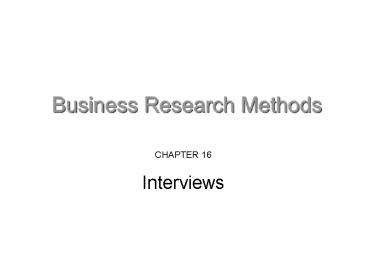Business Research Methods - PowerPoint PPT Presentation
1 / 16
Title:
Business Research Methods
Description:
CHAPTER 16 Interviews Interviews serve many purposes Interviewing for information Advantages and disadvantages of the method Not just a conversation If interviews are ... – PowerPoint PPT presentation
Number of Views:182
Avg rating:3.0/5.0
Title: Business Research Methods
1
CHAPTER 16 Interviews
2
Interviews serve many purposes
3
Interviewing for information
Information that interviews can usefully elicit
facts
personal information
beliefs and assumptions
feelings
values
INTERVIEWS
intentions
interpretations
evaluations
4
Advantages and disadvantages of the method
5
Not just a conversation
- If interviews are to form the basis for
trustworthy and credible conclusions, great care
is needed over - Interviewee selection
- Question design
- Interviewing skills
- Recording, analysis and reporting of interviews
- Practical considerations
- Ethical issues
6
Minimising bias is essential
Forces for and against bias
7
Interviews need careful design
Aspects which need to be designed
topics to address
managing expectations
social flow
DESIGN ISSUES
content flow
language and questions
follow-up
recording
interviewees
8
Social flow
The social flow of an interview
9
Establishing rapport
- Helpful behaviours
- Smiling
- Mirroring physical postures
- Mirroring language type
- Listening carefully
- Note Too much rapport can engender bias via the
desire to please
10
Structured or unstructured?
- Structured interviews
- akin to a questionnaire
- Advantages face validity, reliability,
generalisability, ease of analysis, low
interviewer influence, less skill needed higher
response rates likely than for a questionnaire - Disadvantages lack of flexibility, value limited
by prior decisions re appropriate questions
takes more time than a questionnaire
11
Structured or unstructured?
- Unstructured interviews
- Advantages Flexible, open, unconstrained by
interviewers pre-existing mindset, ideal for
issues when you have few preconceived ideas - Disadvantages Potential for interviewer
selectivity and influence, hard to analyse, low
comparability and generalisability, may lack
credibility with readers of a positivist
persuasion
12
Semi-structured or a mix?
- Semi-structured interviews
- Balance of advantages/disadvantages depends on
context semi-flexibility, semi-openness, some
comparability and generalisability, relatively
high face validity, easier to analyse than
totally unstructured, harder than structured ones - Mixed structure uses different degrees of
structure at different points in the interview
13
Question types
- Open
- Closed
- Prompts
- Probes
- Tests of understanding
- plus not quite questions Summaries
- Note All questions need to be clear, be
unambiguous, address a single point, and not
lead to a biased answer
14
Uses of closed questions
- Closed questions can elicit specific information
and also, in a mixed structure interview - act as filtering or streaming questions
- vary the pace of the interview
- serve to pull back someone who is becoming too
verbose - check understanding
15
Before interviewing . . .
- Planning and preparation is crucial
- Decide which questions will provide the most
useful information - Consider whether your questions or the context
might influence the interviewee - Pilot the questionnaire with people similar to
your intended sample - Plan how you will record and analyse your
interview findings use audio recording wherever
possible
16
Ethical issues
- Ensuring genuinely free and informed consent
- Question design
- Honesty
- Confidentiality
- Power issues































